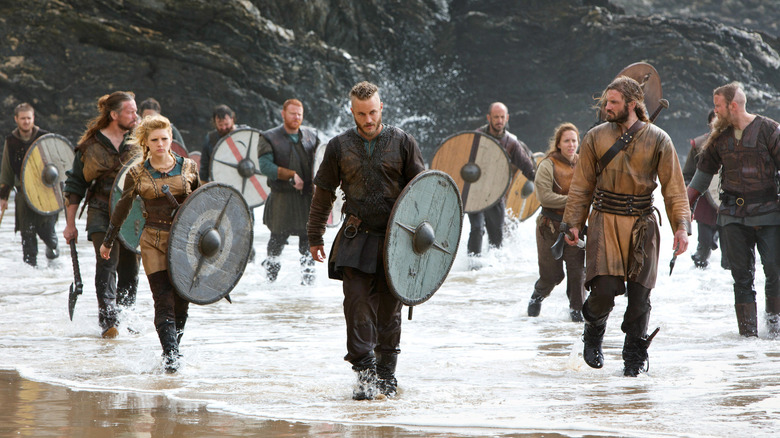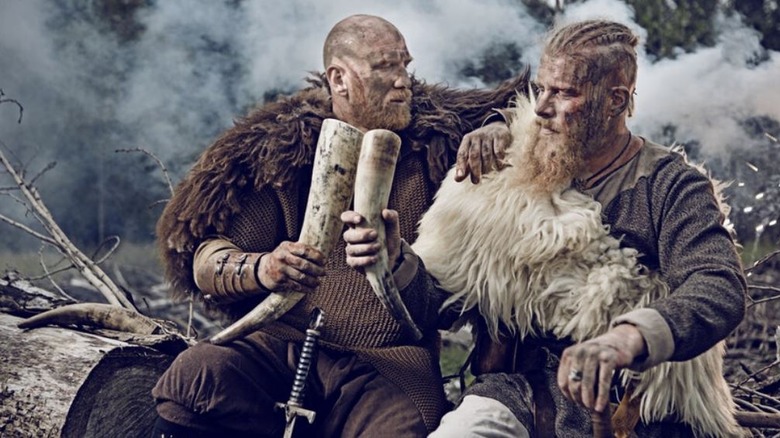Since its debut in 2013, the History Channel’s Vikings has carved out a unique route in a television world dominated by programmes like Rome and HBO’s Game of Thrones, leaving an unforgettable imprint on the small screen. The historical programme has had millions of eyeballs hooked to the screen through both good and bad with six seasons of characters evolving, changing, and — in some cases — dying.
Even if the Vikings plots frequently take unexpected turns, many things always remain the same, especially when it comes to accurately recreating the historical era on which the show is based. Language is one item that is still used now exactly as it did when the Vikings were present. According to TV Insider, the Vikings actors are able to speak Old Norse and Old Low Franconian as effortlessly as English because to dialect coach Poll Moussoulides’ presence on site.
And if there is one word that is frequently used, it is “skol.” The meaning is as follows.
Skol is the friendliest word on Vikings
No two historians or dictionaries can agree on the precise meaning of skol because it is both a historical fact and a word in a foreign tongue. The only thing that is certain is that the term comes from Scandinavia, as seen by its original spelling, skl, with the “” being regarded as an altogether different letter from the “a.”
Skol is frequently heard on Vikings during scenes rich in food and drink, when friendship is at its height and everyone is in a good mood. Similar to how individuals could say “cheers” today before clinking glasses, it serves as a form of toast. It serves as a symbol of camaraderie and goodwill in a plot replete with violence, treachery, and tragedy, making it one of the show’s high points. Skol can, to varying degrees, imply “excellent health” (Collins English Dictionary), “to drink something, especially beer, all at once without pausing,” and other things according to various dictionaries. Whatever the case, the greatest approach to utilise skol is to show your deepest gratitude for enjoyable company.
Contrarily, according to a Daily Norseman article, “Viking warriors would decapitate the king or leader of the tribe/army they had just defeated and that night would drink from his skull — spelled skoll — as a symbol of respect for the fallen opponent.” However, this perception is mostly based on popular misconceptions about Vikings as barbarians and may be historically erroneous. Similar to how pirates are frequently stereotyped, legends about Vikings frequently highlight or exaggerate their most obnoxious traits.
Because they illustrate ancient civilizations as complex affairs, programmes like Vikings—which, to be honest, can be inaccurate—are worthwhile to watch. Indeed, skol.
Skol and other Old Norse words used today
Skol, an Old Norse word, is still used today and is used rather frequently. The football team from Minnesota, the Vikings, has fully embraced the saying and even included it in their official theme song. The players are sent into “war” by a massive Gjallarhorn that resounds around U.S. Bank Stadium while the team’s supporters yell “skol” to get themselves hyped up. Skol isn’t the only term that has been used in modern contexts, though. According to History, the Old Norse language of the Vikings had a significant influence on modern English; terms like “angry” and “child” have Scandinavian origins. The word “Thursday,” which was adapted from the Viking term for “Thor’s day,” is arguably the most well-known example.
With the second half of its sixth season, which is scheduled to air in late 2020, Vikings will come to an end. What more Norse terms and phrases might viewers learn before the performance is over? Only time will tell.



